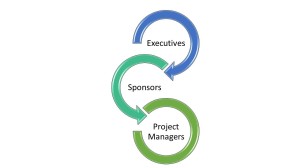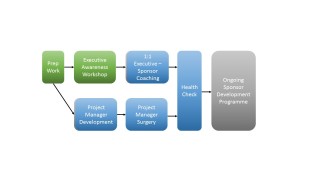‘We are unique individuals with unique experiences’ John Gray, Men Are from Mars, Women Are from Venus
Men Are from Mars, Women Are from Venus is a book written by an American author and relationship counsellor John Gray. It has sold more than 50 million copies (yes that is one or two more than my own best-selling book The Lazy Project Manager) and spent 121 weeks on the US bestseller list.
The book and its central metaphor have become a part of popular culture and so I found myself, as I thought about the ongoing Campaign for Real Project Sponsors that I began back in 2011, that maybe we could think of project managers and project sponsors in similar terms.
The book states that most of common relationship problems between men and women are a result of fundamental psychological differences between the genders, which the author exemplifies by means of its eponymous metaphor: that men and women are from distinct planets – men from Mars and women from Venus –- and that each gender is acclimated to its own planet’s society and customs, but not to those of the other.
Now it is possible that this comes in to play if say the project manager is a man and the project sponsor is a woman – as in the book Strategies for Project Sponsorship (Management Concepts Press) by Vicki James, Ron Rosenhead and myself – to aid the understanding in the book of the two inter-playing roles we (a suggestion from the lady from Venus, Vicki, actually) agreed to separate the roles by gender. But let’s not go down that path for now – let us assume that gender plays no part in this and that the two roles, the two people, are both from project ‘Planet’ (sorry maybe that was just a tad too corny but you get my meaning).
For project success many sources of authority[1] boldly declare that good project sponsorship is critical but sadly the reality of the situation is less than perfect. Often—very often—project sponsors will have received no training or support for their critical role. In Strategies for Project Sponsorship we confirmed that with 85% of organisations declaring that they ‘had sponsorship’ in place but 83% confirmed the worrying truth that they did nothing to support or train or guide these project sponsors.
Many speak of the ‘accidental project manager’ but the reality is that the current generation of project sponsors can also be considered the ‘accidental project sponsors’. Although they may not have any background in project management or project-based activity, having reached a senior level within their organisation based on other achievements, they have assumed or have been given that role. Remember that there is not currently any official body of knowledge for project sponsors to help them understand best project sponsorship practices.
And yet project sponsors don’t just need to support projects; good project sponsors also support the project manager and project team. It is said that a project is one small step for a project sponsor and a giant leap for the project manager. Wouldn’t we all feel so much better if we knew that the project sponsor’s one small step would ensure that the complementary giant leap would lead to a safe and secure final landing?
The project sponsor/project manager partnership is one that really needs to be a good partnership built on a relationship of trust and mutual objectives.
‘If I seek to fulfil my own needs at the expense of my partner, we are sure to experience unhappiness, resentment, and conflict. The secret of forming a successful relationship is for both partners to win’ John Gray
Project sponsorship is not about an ‘either/or’ situation but a ‘win/win’ for both the project sponsor and the project manager, it is, after all, about the project and therefore about the business benefit.
If we look at the flipside of project success we can see this inter-connection and the consequences of getting it wrong:

This is a list of top project failure issues and clearly the lack of good project sponsorship can contribute to the unrealistic goals, the poor alignment, lack of resources and lack of leadership – in this case the project manager from Mars has one heck of a gaping hole to try and fill. Equally with a lack of good project management this contributes another vacuum of leadership, team engagement issues and poor risk management – in this case the project sponsor from Venus has no hope of dealing with the consequential impact.
In the book we found that the best of project sponsors operated in a very balanced way, being involved in the project, being objective about the project, being supportive of the project and project manager, and being reactive to project needs. The project manager clearly needs to be as equally balanced.
We also found that the best project managers understood what a good project sponsor should do and how they, as project managers, needed to behave within the reality of the partnership that they had, and with the project sponsor that they were ‘given’. Like the saying goes ‘you can pick your friends but you can’t pick your relatives’ it has to be appreciated that the same is true of project sponsors.
Each project sponsor (and each project manager) will be different, will be imperfect, will have strengths and weaknesses but if the combined relationship of the two roles, the two people, both understand each other’s responsibilities and capabilities then the best balance possible can be achieved for an effective and positive relationship (and subsequent project success).
‘Relationships thrive when communication reflects a ready acceptance and respect of people’s innate differences’ John Gray
If you work in an organisation that needs to develop your project sponsors from Venus (and maybe also your project managers from Mars) then maybe check out the book, or contact me to find out how I can help. And spread the word, we do really need everyone to join the Campaign for Real Project Sponsors; there is a lot (a lot) of work to be done.
As an example, the latest PMI Project Management Body of Knowledge[2] (Edition 5) is a valuable and extensive document of reference with 185,230 words of wisdom crammed inside. Sadly of those words only 159 refer to project sponsorship at all, I’ll raise it to 179 words by generously including the 20 words in the glossary that refer to ‘organisational sponsorship’ – I am being generous as it mentions project sponsorship as one word ‘sponsor’s’ (and Project Sponsor is not in the glossary as a term). Anyway that means this most widely referenced body of knowledge has a mere 0.01% content related to the ‘most important person in the project…’[3]
OK I hear what you are saying, Peter that is the ‘Project Management’ body of knowledge so don’t be so harsh. Well maybe I might take the point (actually I wouldn’t, at the very least we should see a whole lot more about how the project manager needs to interact with the project sponsor but for the sake of this particular argument …) so let’s move across to the perspective of the organisation.
The OPM3 / Organizational Project Management Maturity Model[4] looks at the overall maturity of project based activity inside and organisation so there is no escaping the project sponsor on this one is there?
Well it seems that the answer to that question is surprisingly a big fat ‘Yes’.
Out of the 151 Self-Assessment Measures only 1 is related in any way to project sponsorship; ‘Are the sponsor and other stakeholders involved in setting a direction for the project that is in the best interest of all stakeholders?’
At least it is question number 1 on the list.
And of the 600 Best Practice measurements only 3 reference project sponsorship, numbers 1440, 1450 and 5460.
See what I mean? Still don’t think we have a problem?
This needs to be taken seriously and changes need to happen, fast.
There is some fantastic work going on with and for project managers, we have landed on Mars and we are setting up home and making it look dammed good; but the balance is all on that side. Venus, on the other hand is pretty much undeveloped and in need of a real make-over.

You can find out more at www.strategies4sponsors.com and you can also join the LinkedIn group – Projects Sponsors, to continue the discussion. Or contact me at peter.b.taylor@btinternet.com
‘Strategies for Project Sponsorship is a unique blend of practical, step-by-step tools; hard-won wisdom from the PM trenches; and solid, research-based recommendations. As a PM author reading this book, I found myself in awe of how nimbly the authors weaved together seemingly disparate elements: here citing research findings, there providing war stories or case study examples, and finally pivoting to morph these into powerful, ready-to-use tools. As someone who’s both managed projects and trained project managers for more than three decades, I know this for certain: This book should be in every project manager’s tool kit and in every project sponsor’s briefcase’ Michael Greer
Peter Taylor is the author of two best-selling books on ‘Productive Laziness’ – ‘The Lazy Winner’ and ‘The Lazy Project Manager’.
In the last 4 years he has focused on writing and lecturing with over 200 presentations around the world in over 20 countries and with new books out including ‘The Lazy Project Manager and the Project from Hell’, ‘Strategies for Project Sponsorship’, ‘Leading Successful PMOs’, and ‘The Thirty-Six Stratagems: A Modern Interpretation of a Strategy Classic’ – with a number of other book projects currently underway.
He has been described as ‘perhaps the most entertaining and inspiring speaker in the project management world today’ and he also acts as an independent consultant working with some of the major organizations in the world coaching executive sponsors, PMO leaders and project managers.
His mission is to teach as many people as possible that it is achievable to ‘work smarter and not harder’ and to still gain success in the battle of the work/life balance.
More information can be found at www.thelazyprojectmanager.com and www.thelazywinner.com – and through his free podcasts in iTunes.
- Keynote
- Presentations and Lectures
- Master of Ceremonies
- Inspirational Workshops
- Training
- Coaching
- Authoring
[1] Check out Project Management Institute, Inc. Pulse of the Profession™, March 2013 and CHAOS Manifesto: The Year of the Executive Sponsor (Standish) 2012 and PricewaterhouseCoopers LLC: Insights and Trends: Current Portfolio, Programme, and Project Management Practices 2012 – The third global survey on the current state of project management as just a few.
[2]. The PMBOK® Guide—Fifth Edition is the preeminent global standard for project management from PMI. It provides project managers with the fundamental practices needed to achieve organizational results and excellence in the practice of project management.
[3] One of PMI’s foundational standards, the Organizational Project Management Maturity Model (OPM3®) – Third Edition is a guide to achieving organizational project maturity.







